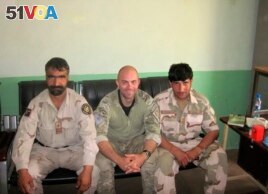19 August 2021
Mohammad Khalid Wardak was a well-known national police officer who worked alongside American special forces. He had no plans to leave Afghanistan. He planned to stand with his fellow Afghans to defend his homeland after U.S. forces were gone.
Then, the government collapsed. His president fled. And now Khalid, as his friends call him, is in hiding. He hopes that American officials will honor his loyalty by helping him and his family escape from the Taliban.
But time and U.S. policy are against him. Interpreters and others who worked for the U.S. in Afghanistan are permitted to apply for special immigrant visas. But Afghan military members or police officers are not. The State Department said they could apply for refugee status, but Khalid's supporters say his family needs to get out now.
A brother in arms
His friends in the U.S. military say he is a "brother in arms" who helped save many lives. They are asking for help — from elected leaders and officials — to get Khalid and his family inside the Kabul airport so they can be taken to another country.
The U.S. still controls the airport, where Americans and some Afghans are leaving the country.
Army Special Forces Sgt. Major Chris Green worked with Khalid. He is among several current and former military members pressing his case. "It is this nation's duty to help those who helped us and were loyal to us and their country," he said.

In this undated photo provided by Ryan Brummond, U.S. Special Forces Officer Ryan Brummond, center, is seated next to Mohammad Khalid Wardak, right, in Afghanistan.
Robert McCreary is a former White House official under President George W. Bush. He worked with special forces in Afghanistan. He said those like Khalid are top Taliban targets because of their work with U.S. forces, and they deserve special attention. "They're shouting his name in the street, looking for him, hunting for him," McCreary said.
Wounded two times
Khalid came to the rescue in March 2013, when a special forces group in eastern Afghanistan's Wardak province was attacked. He hurried into the valley with a police team to defend his American partners.
In 2015, Khalid lost part of his right leg in an attack. Friends in the U.S. military helped get him medical care and an artificial leg outside the country. A month later, he was again leading special police operations in Afghanistan alongside the U.S., Green said.
Along the way, he helped catch al Qaeda and Taliban leaders. He went on to serve as police chief in Ghazi and then Helmand, where he was wounded again last month. He continued to direct the resistance from his hospital bed.
"Khalid was — is — a true patriot to Afghanistan, but also resolute in support to the Americans," said Green, who said he saw Khalid's bravery and leadership many times. Khalid even went on television and radio to say, "how we were protecting the Afghan people and the Americans, and then daring the Taliban to drop their terrorist methods and come fight him face to face," Green said.
McCreary said Khalid and his family should be able to apply for special immigrant visas or refugee status because he no longer works for the Afghan government. "People in Khalid's situation ... had no plans of leaving Afghanistan," McCreary said. "They were staying there to fight to the end."
If they can leave, many in the U.S. military would gladly offer to help.
"Without a doubt, any one of us would take these guys, these police officers, these Afghan soldiers into our homes, with their families, and do anything we could to help them just continue to live," Green said.
McCreary warned that time is running out.
"We know what's going to happen, and it's not good," he said.
I'm Jill Robbins.
Alex Sanz, Tammy Webber and Matt Lee reported on this story for the Associated Press. Jill Robbins adapted it for Learning English. Hai Do and Susan Shand was the editor.
________________________________________________________________
Words in This Story
interpreter – n. a person who translates the words that someone is speaking into a different language
brother in arms – expression. a soldiers fighting together with other soldiers, especially in a war
persecute – v. to treat (someone) cruelly or unfairly especially because of race, affiliation or religious or political beliefs
patriot – n. a person who loves and strongly supports or fights for his or her country
resolute – adj. very determined: having or showing a lot of determination
province – n. any one of the large parts that some countries are divided into
artificial – adj. not natural or real; made, produced, or done to seem like something natural
dare – v. to tell (someone) to do something especially as a way of showing courage
What do you think of the current situation for those who helped the U.S. military in Afghanistan? We want to hear from you. Write to us in the Comments Section.